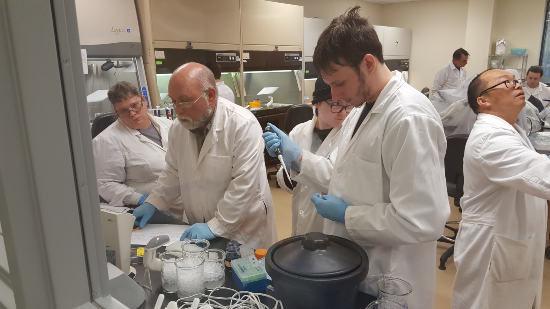Editor’s note: Each Wednesday, WRAL TechWire features a story highlighting the NC Bio Jobs Hub initiative. Go to the Bio Jobs Hub for more stories and info on life sciences job opportunities made possible by NC’s workforce training initiatives.
+++
RESEARCH TRIANGLE PARK – Biotechnology education has a long and significant history in North Carolina’s Piedmont Triad region of Alamance County, which is lauded as the top small metropolitan statistical area in the nation for research, analysis and strategy consultancy in health diagnostics and testing.
Since it launched the first-of-its-kind two-year biotechnology program in 1985 through a partnership with global healthcare diagnostics giant Labcorp, Alamance Community College’s role in regional workforce development has only grown. Each year, it graduates over one-fourth of the state’s community college biotechnology talent.
“One of the things that sets our program apart is that in two years’ time, our biotech students receive over 700 hours of hands-on lab training in addition to their classroom training,” said Yonnie Butler, executive director of ACC’s Biotechnology Center of Excellence. “That is more than four-year schools typically offer.”

— ACC photos
ACC is also setting itself apart from four-year colleges and universities with its ability to quickly adapt to companies’ needs. When Israeli-based Avgol Industries was seeking a partner to assist with developing, testing and launching one of its global health care products, it turned to ACC after four-year schools declined due to the red tape involved.
For ACC, the program provided an opportunity for their students. “One thing we are trying to do more and more is have our students work on real-world projects,” explained Butler. “It benefits them because they get real-world experience.”
The project also illustrates what Butler sees as a unique community college strength: flexibility.

“Two of the things that set the community college apart are flexibility and nimbleness,” said Butler. “A partner can come to us, and we can write down what they need on the back of a napkin. In two weeks, we have a class up and running. By having a corporate education division, we can offer classes at any time.”
Community colleges are also gaining a reputation for graduating students who are ready to work on day one.
“One thing we have heard from industry partners is that they traditionally only hired four-year graduates,” Butler said. “Now, they are finding that two-year graduates with biotech degrees have the roll-up-their-sleeves attitude to get things done.”
For Butler, the impact community colleges have extends to their students.
“What we are doing is life changing for the individual, their families and multiple generations,” said Butler. “They are going from a job to a career.”
ACC Biotechnology Center for Excellence to Expand Programs
Next year, ACC will open its Biotechnology Center for Excellence. The 33,000-square-foot facility will bring up to 20 labs, classrooms and multipurpose rooms to the college’s main campus. It will serve students and faculty in biotechnology, medical laboratory technology, histotechnology and agricultural biotechnology programs.
The $17.6 million investment will not only give students sophisticated learning spaces but will also provide incubator space to private companies. The third floor is designed with expansion and outreach in mind, with the ability to house a simulated clinical space and biopharmaceutical manufacturing facility. By providing collaborative opportunities to local companies in this newly available space, students who use the Center of Excellence will benefit from their proximity to professional workers and mentors.
In 2019, Burlington-based Labcorp pledged to help fund the project, reflecting a nearly four-decade partnership with the college. Since then, it has also helped launch the medical laboratory technology and histotechnology programs. It has already hired over 100 of ACC’s graduates and plans to continue its commitment to the local community through its workforce development initiatives.
(Note: A version of this story was published May 5, 2021)
(C) N.C. Biotech Center





























